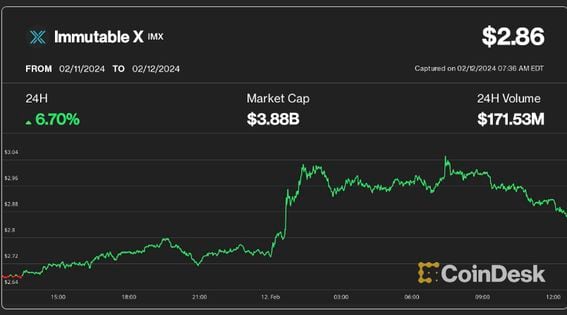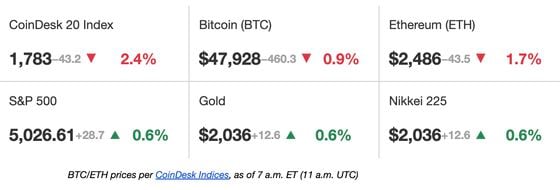First Mover Americas: Bitcoin Hovers Below $48K; Immutable X Soars

Contents

10 Years of Decentralizing the Future
May 29-31, 2024 – Austin, TexasThe biggest and most established global hub for everything crypto, blockchain and Web3.Register Now
This article originally appeared in First Mover, CoinDesk’s daily newsletter, putting the latest moves in crypto markets in context. Subscribe to get it in your inbox every day.
Latest Prices

Top Stories
Despite bitcoin (BTC) starting the week lower, the leading cryptocurrency by market value has risen more than 13% in the seven days to Feb. 12, the biggest one-week gain since October. The CoinDesk 20 Index, a measure of the biggest cryptocurrencies, added 11%. Continued inflows into the U.S.-based spot BTC exchange-traded funds (ETFs) probably overshadowed reports of bankrupt crypto lender Genesis seeking approval to liquidate its $1.6 billion bitcoin holdings. Ether (ETH) was down almost 2% on Monday and bitcoin lost around 1%. The token of Immutable X (IMX), a layer-2 scaling solution on Ethereum that focuses on NFTs and gaming, jumped as much as 8% over the same period. IMX has gained 33% in seven days. At the end of January Immutable launched zkEVM early stage mainnet access. The ecosystem is supposed to help games thrive, offering gas-free interaction for gamers and smart contract compatibility.
The Philippines is likely to issue a wholesale central bank digital currency (CBDC) within two years, central bank Governor Eli Remolona Jr told journalists, but doesn’t plan to use the blockchain or digital ledger technology that underpins many virtual assets. “Other central banks have tried blockchain, but it didn’t go well,” Remolona said, the Inquirer reported Monday. CBDCs are digital tokens issued by central banks. Retail CBDCs can be used by the general public whereas wholesale ones are exclusively for institutional use. The Philippines central bank started an exploratory study into CBDC’s in 2020. The Bank for International Settlements, which coordinates between central banks worldwide, in November said the institutions aren’t sufficiently prepared for the risks posed by CBDC.
New York Attorney General Letitia James amplified the civil fraud case against Digital Currency Group (DCG), now saying the company is responsible for $3 billion in investor losses tied to the Gemini Earn product and to direct investments with Genesis, according to a Friday court filing. As stated in October’s initial $1 billion fraud lawsuit against DCG, its defunct lending platform Genesis and Gemini Trust Co., the companies are accused of misleading investors and assuring them of the safety of their money even as the companies’ managements were aware that doom fast approached them. The fraud case focused at first on the Gemini Earn investment program that Genesis and Gemini ran together, but after the lawsuit, James’ office said many more investors raised complaints of being swindled by Genesis more directly.
Chart of the Day

- The chart shows the ratio between Deribit’s ether and bitcoin DVOL indices. DVOL represents annualized 30-day implied volatility or expectations for price turbulence over the next four weeks.
- The negative ratio shows that ether volatility is underpriced relative to bitcoin, even though Ethereum’s Dencun upgrade is just four weeks away.
- Source: Amberdata
– Omkar Godbole
Trending Posts
- Ethereum Validator Entry Queue Signals Renewed Interest in Staking
- New Zealand Central Banker Adrian Orr Says Stablecoins Aren’t Stable: Report
- Ripple-Owned Crypto Custody Firm Metaco’s CEO and Head of Product Depart
Edited by Sheldon Reback.
